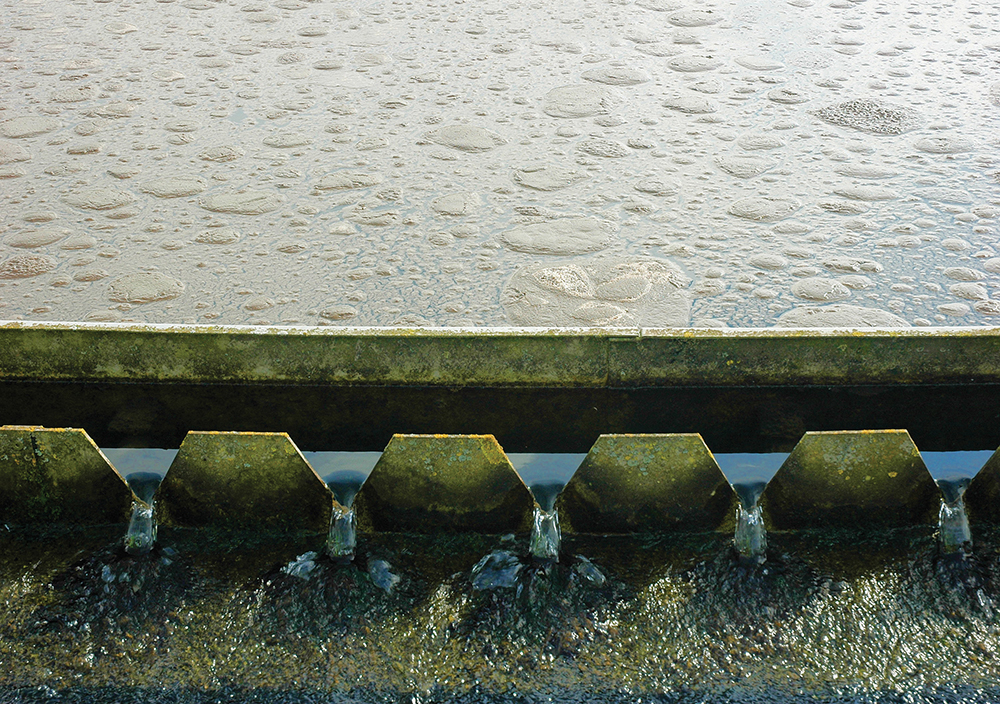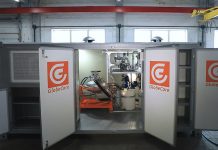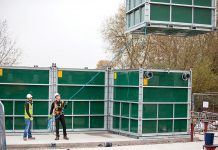Traditionally, Welsh Water have used standard storm storage treatment options to deal with significant flow management into our networks, and combined sewer overflows (CSO) before arriving at our Wastewater Treatment Works. This, along with more innovative approaches such as RainScape, a surface water management approach that includes the use of basins and planters, swales and porous paving, has been used in the past to help reduce spills to the environment.
However, with ever more stringent regulations and the need to reduce costs and keep customers’ bills low, the not-for-profit company have been investing in their innovation programme to look to new technologies and methods to help manage common problems such as this one.
As traditional solutions become less effective in delivering the required spill reductions in a cost-effective manner, Welsh Water and their Capital Alliance Partners looked to new technologies to deliver a solution for Llanelli and Gowerton catchments, in south Wales.
The Research
Through the company’s innovation programme, Welsh Water and partners took a full desktop review and peak flow sampling to research and examine which innovative technologies could enhance their wastewater treatment works process, to allow them to treat the significant additional flows, known as Peak Flow Equivalent Treatment (PFET) to the permit requirements. In addition to a search for innovative and alternative wet weather treatment options, the company used their Technical Assessment Group Membership to access a worldwide review of ready to market or near-ready to market technologies available for trial or use in the water industry.
Following the desktop review, an external gap analysis and more detailed technology treatment options assessment was undertaken by Welsh Water’s Capital Alliance Partner Mott MacDonald Bentley (MMB), to help shortlist twelve technologies, gaining an understanding of the capability of those processes to achieving compliance with numeric permits. The twelve innovative technologies were evaluated against a range of criteria including performance, track record in similar applications, ease of operation and maintenance, ease of construction, and operating costs.
Once options were narrowed down, costs were developed and site visits undertaken and two technologies were collaboratively trialled at Gowerton Wastewater Treatment Works in south Wales.
Flex Filter by WWETCO is a simple gravity system requiring no moving parts. Through innovative application of a hydrostatic force, it filters both large and small particles through a porosity gradient within the filter. The technology was new to both the company and to the UK, although it is used in wet weather treatment in the United States of America.
In addition, Co Mag by Evoqua was trialled. This is an innovative process that uses chemical and magnetite to make a ballasted floc to sink all solids quickly as they are denser, making settlement more efficient and increasing hydraulic capacity. Whilst not new to the UK, this technology was new to Welsh Water.
This collaborative trial was undertaken in partnership with Morgan Sindal, Sweco and MMB and covered nine months on site. It was the biggest trial undertaken by Welsh Water’s Wastewater Services team in the last 15 years, costing over £1 million.
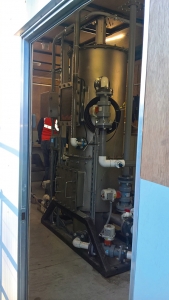
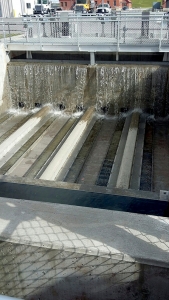
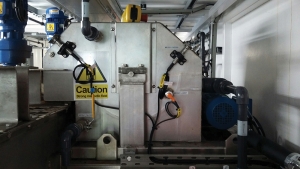
The Trial
The Peak flow equivalent treatment was at the pilot stage when Welsh Water undertook the site trial at Gowerton Wastewater Treatment Works from September 2016 to May 2017. The site trial reviewed how the two technologies would compare on the same influent. The results and assessment of both technologies were pulled together into a final report by Sweco, which reviewed not just the sample results but also covered areas that mattered for the application it was needed. The application for Welsh Water involves the technology to be running on a site which isn’t manned 24 hours a day. It also needed to respond quickly to weather conditions.
Results of the trial
After an overall assessment the Flex Filter was selected appropriate for the site requirements, to achieve the required outputs.
By treating the additional water arriving at the Wastewater Treatment Works, it would enable Welsh Water to enhance treatment process, making it more cost effective than the traditional options such as storage. The PFET option will save Welsh Water over £8 million against current solutions used and allowed them to work towards meeting thier deadline for achieving reduced spills by 2020, therefore improving the local environment.
The trial work used hydraulic modelling data by ARUP for the Rainscape program, which helped support the decision for Welsh Water to take a new, cost-effective approach to challenging flow management at Wastewater Treatment Works and meet their spill permit regulations set by Welsh Government and Natural Resources Wales.
Vicky Wilson, Asset Manager Science for Welsh Water said: “Our Innovation trial testing period has enabled us to the see the benefits of both technologies to our business and we have a much better understanding of how they operate. We will utilise the trial data further for other opportunities that we see for the Welsh Water business. This has been a very successful trial project and huge effort involving five alliance partners requiring joined up working.”
Next steps
The innovation project has now moved on to a more detailed process design stage for full scale delivery by our Alliance partners utilising the trial information. Utilising this technology will help Welsh Water to meet there permit conditions in south Wales by 2020.



